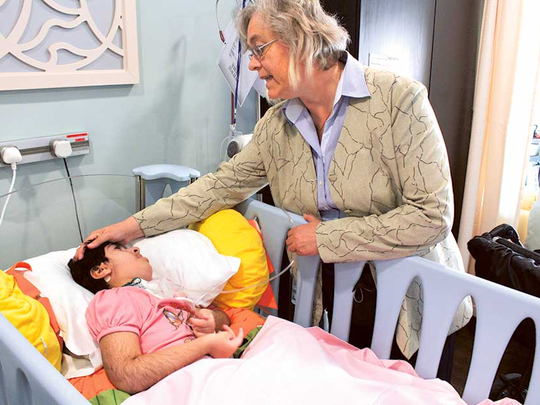
Abu Dhabi: A change in the health insurance law in the emirate of Abu Dhabi now obliges Emirati families to pay 20 per cent of the cost of care at any private facility. While this sounds nominal, this co-payment amount is actually astronomical for families with patients in long-term care, Gulf News has found.
As most patients in long-term care suffer from complex conditions, and also develop many comorbidities during their lifetimes, their care involves regular therapy and round-the-clock care. In many cases, annual co-payment therefore amounts to nearly half a million dirhams or more.
There are currently three health care facilities that provide long-term care and rehabilitation in Abu Dhabi emirate. They are ProVita International Medical Centre, which currently houses more than 110 beds, the Cambridge Medical and Rehabilitation Centre with 180 beds, and Amana Healthcare Medical and Rehabilitation Hospital.
According to reports from top executives, more than 95 per cent of patients at these facilities are Emirati. A significant proportion are being treated for genetic and congenital disorders, while others have suffered traumas and injuries and require 24-hour medical attention.
In this context, private facilities that provide long-term care in the emirate may eventually have to cut back on the added amenities they offer their patients. These include trips to patients’ favourite places, outdoor visits, and trips back home on special occasions, Gulf News has learnt.
Emirati families with members in boarding at these facilities are dismayed at the news.
“I have already had my child stay in a hospital, and found little progress in his abilities. If these additional services are removed, I don’t see how he would get better, or how his care would be different from the no-frills medical care he would get in a hospital,” Umm Hamad, a 28-year-old mother told Gulf News. Her seven-year-old son is a long-term patient at a private care and rehabilitation centre in Abu Dhabi.
“We do not ask for much, just the trip to the mosque he takes every Friday which is so important for my father,” said Farida, daughter to a 72-year-old long-term care patient at ProVita International Medical Centre.
Despite families being obliged to pay the 20 per cent co-payment for their members’ care at private facilities, none has yet settled the bills. And top executives at Abu Dhabi’s private rehabilitation and long-term care facilities say they will not turn patients away simply because of an inability to pay.
“We will not reduce the number of caregivers and clinicians dedicated to patient care, and ride out the rest of the year to see how much families are able to pay. If they cannot cover the full amount, we may have to reconsider the provision of additional amenities, like trips to the mall and football games, or Ramadan Iftars with the family,” said Michael Davis, chief executive officer at ProVita.
Dr Howard Podolsky, chief executive officer at Cambridge Medical and Rehabilitation Centre, said the facility would have to look at all aspects of the cost structure, and patient expenses.
“We will not turn patients away, but we do have to manage our cost structure, including elements like added amenities that are offered. We know, however, that these provide a fuller living experience for our patients,” Dr Podolsky added.












